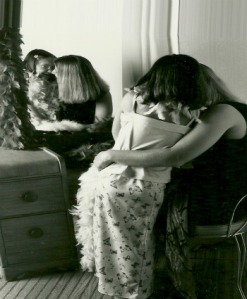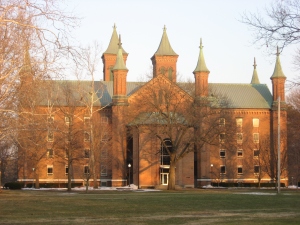Many days I sit and stare at my blank computer page while dozens of ideas flow through my head. They start at one side of my brain, squiggle their way into the area just behind my forehead – where I spend a few minutes contemplating them – and then quickly race off as the next set of ideas chases them away, demanding that I move my focus from the old, fleeting thoughts to the newer, stronger, prettier ones. And, of course you know what happens, right? Yup. I wind up with nothing on the page.
days I sit and stare at my blank computer page while dozens of ideas flow through my head. They start at one side of my brain, squiggle their way into the area just behind my forehead – where I spend a few minutes contemplating them – and then quickly race off as the next set of ideas chases them away, demanding that I move my focus from the old, fleeting thoughts to the newer, stronger, prettier ones. And, of course you know what happens, right? Yup. I wind up with nothing on the page.
Today I found myself sitting in front of my laptop, contemplating all kinds of topics such as what cultural triggers caused my mother and grandmother to marry at young ages, even though they preferred to pursue their own educational or professional interests, or the various ever-present issues surrounding the treatment of girls in sports. I even spent a few minutes basking in the joy of observing my daughter share an article on her Twitter feed about the continued economic importance of women’s access to birth control.
And I wondered to myself, “What, if anything, does any of this have to do with celebrating women? How do I write about any of these topics and bring about some sort of resolution?”
While admittedly these topics are quite broad and individually provide enough fodder for blog posts of their own, I think for today I will just keep them together and address the importance of the fact that not a day passes that I don’t think about things that affect women in some way or another. And neither should you.
For example, think, for just a second, about your mom. Did you ever take time to find out what motivates her to pursue the interests that she does? What are her greatest achievements? Does she have any regrets? Why did she make the decisions she did that led her to her present stage in life? Were her decisions based on cultural ideals that dictated “proper” behavior at that time? Or were they based on goals and dreams she – and perhaps those whom she admired and respected – designed for herself? If you, like me, have spent energy researching and contemplating these things, then good for you! You, too, are celebrating women on a regular basis simply by harboring a genuine interest in the lives of the women important to you.
If, however, you don’t know the answers to any of these questions, then consider yourself challenged. Go, now, and ask your mom (or your grandmother, or your sister, or your wife, or your next-door neighbor) the following questions: What motivated you to (marry/not marry, earn a degree, seek out a specific profession, have/not have children, etc.)? How did you feel you fit in with the cultural norms of your youth? Or, did you not fit in? How do you feel about your decision now? What was your greatest achievement and why? What are your hopes and dreams for girls and women of the future?
Take time to learn about the women around you.
After all, knowledge is power, and once all of us learn to appreciate the importance of allowing our girls to pursue their hopes and dreams in the same manner we allow our boys to do so, our economies strengthen, our world grows safer, and our lives become more enriched.




